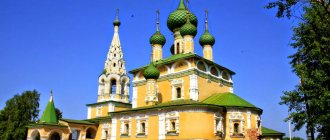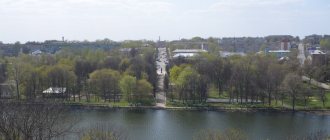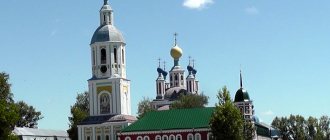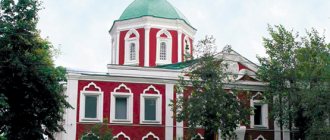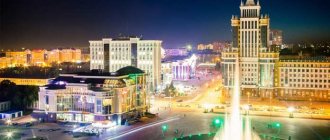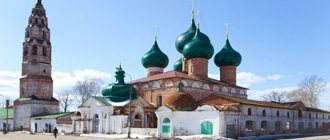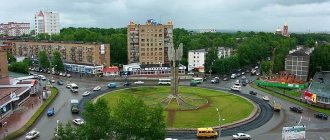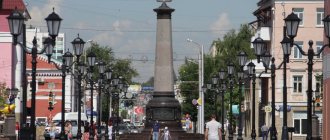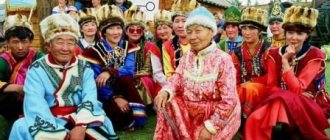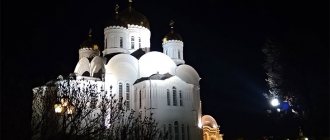This term has other meanings, see Alekseevka.
| City Alekseevka Flag | Coat of arms |
| A country | Russia, Russia |
| Subject of the federation | Belgorod regionBelgorod region |
| Municipal district | Alekseevsky |
| urban settlement | Alekseevka city |
| Coordinates | 50°38′00″ n. w. 38°41′00″ E. long / 50.63333° north w. 38.68333° E. d. / 50.63333; 38.68333 (G) [www.openstreetmap.org/?mlat=50.63333&mlon=38.68333&zoom=12 (O)] (Z)Coordinates: 50°38′00″ N. w. 38°41′00″ E. long / 50.63333° north w. 38.68333° E. d. / 50.63333; 38.68333 (G) [www.openstreetmap.org/?mlat=50.63333&mlon=38.68333&zoom=12 (O)] (I) |
| Head of Administration | Sergachev Stanislav Valerievich[1] |
| Based | in 1685 |
| First mention | 1685 |
| City with | 1954 |
| Square | 34 km² |
| Center height | 120 |
| Official language | Russian |
| Population | ↘38,566[2] people (2016) |
| Density | 1134.29 people/km² |
| National composition | Russians, Ukrainians and others |
| Confessional composition | Orthodox and other denominations |
| Names of residents | Alekseevtsy, Alekseevets |
| Timezone | UTC+3 |
| Telephone code | +7 47234 |
| Postcode | 309850 |
| Vehicle code | 31 |
| OKATO code | [classif.spb.ru/classificators/view/okt.php?st=A&kr=1&kod=14410 14 410] |
| Twin Cities | Kupyansk, Kharkov region, Ukraine |
| Alekseevka Moscow |
| Belgorod Alekseevka |
Audio, photo and video
on Wikimedia Commons
K: Settlements founded in 1685
Alekseevka
- a city (since 1954[3]) in Russia, the administrative center of the municipal district Alekseevsky district of the Belgorod region, forms
the urban settlement "City of Alekseevka"
. Until 1954, the city was part of the Voronezh region.
Content
- 1 Geography
- 2 History
- 3 Population
- 4 Administrative device
- 5 Education
- 6 Economy 6.1 Industry
- 7.1 Newspapers
- 8.1 Temples
- 9.1 Sports facilities
Church of St. George the Victorious (Repenka)[edit]
In 1852, a wooden church of the Holy Great Martyr George the Victorious was built in the village of Repenka.
In 1933, the temple in Repenka was closed and looted.
Since 1937, the temple building housed a warehouse, and since 1953 - a rural club.
In 1993, the St. George Church was handed over to the believers of the village of Repenka. At the beginning of the twentieth century, domes were installed on the temple.
Address:
309832, Belgorod region, Alekseevsky district, village. Repenka, st. Central, 62.
Telephone:
+7(47234) 5-45-28
Story
Alekseevka was founded as a settlement in 1685 (according to other sources - in 1691). Later known as Alekseevskaya Sloboda
in Userdsky district of Voronezh province. The name, apparently, comes from the name of Prince Alexei Mikhailovich Cherkassky (1680-1742), who owned the lands and peasants of Alekseevka.
A serf peasant from Alekseevka, Daniil Semyonovich Bokarev, discovered a method for producing sunflower oil (in 1829). In 1833, the first oil mill in Russia was built in Alekseevka. According to the 1877 census, there were 14,554 inhabitants in the Alekseevka settlement. Thanks to the development of oil production at the end of the 19th century, the settlement became one of the most populous settlements in the Black Earth Region. 12.3 thousand people lived in Alekseevka itself, and together with the adjacent settlements Nikolaevka and Dmitrievka - 18.5 thousand people. There were 12 churns, 15 tanneries, 20 windmills, 5 churches and the same number of schools, a pharmacy, a hospital, and many shops.
Alekseevka received city status in 1954.
Climate
The moderate continental climate of Alekseevka provides warm summers and mild and snowy winters. This weather is considered the most favorable for living. The average January temperature is −7…−9 °C, the average July temperature is +18…+20 °C. A feature of the climate is the uneven distribution of precipitation over the seasons. The greatest amount of precipitation falls in summer - 30-40%, the least in winter - 15%. The first snow falls in October or November. The stable snow cover reaches an average of 18 cm.
Economy
Industry
- Plant for the production of refined and unrefined sunflower oils and mayonnaise and a plant for the production of specialized fats and margarines of the EFKO company[19]
- CJSC "Alekseevsky Sugar Factory"
- OJSC "Alekseevka Khimmash"
- CJSC Alekseevsky Milk Canning Plant
- CJSC "Bread Factory" (part of the Agro-Industrial Corporation "Stoilenskaya Niva")
- OJSC Boiler Equipment Plant
- CJSC "Alekseevsky Feed Mill"
Church of the Assumption of the Blessed Virgin Mary (Lutsenkovo)[edit]
According to the Decree of the Holy Synod of April 7, 1846 “On the construction of a wooden church in the Lutsenkovo farm with the formation of a separate parish,” a temple was built on the farm.
In 1928 the temple was closed.
In 1930, a tractor repair workshop was located in the temple building.
The newly built Assumption Church was consecrated on December 10, 2010 by Archbishop John of Belgorod and Stary Oskol.
Address:
309824 Belgorod region, Alekseevsky district, village. Lutsenkovo, st. Central, 9.
mass media
Radio
- 71.78 Radio Russia / Radio Russia - Belgorod
- 88.9 Russian radio
- 91.6 Radio "Radio"
- 101.0 Traffic radio
- 103.5 World of Belogorye
- 107.3 Russian Radio
A television
- 6 Channel One
- 8 NTV / TRC Alekseevka
- 12 Russia 1 / Russia - Belgorod
- 23 Efko / World of Belogorye
- 25 TVC
- 39 Channel Five (Russia)
- 50 The first digital television multiplex in Russia
Newspapers
- "Zarya"
Attractions
Temples
- Church of St. Alexander Nevsky, built in 1888.
- Church of St. Dmitry the Wonderworker of Rostov, built in 1813.
- The Church of the Holy Trinity, the oldest stone building, was built in 1808.
Architectural monuments
- The tavern of the merchant Kriklovinsky, built in 1880-1891.
- The house of the owner of the oil factory, Kovalev, was built in 1890.
The house of a major merchant Miroshnikov, built in 1865.- The house of a large timber merchant Sanzherov, built in 1890.
- The merchant club of the Bokarev family, built in 1895.
- The house of the Bokarev family with a store, built in 1890.
- The merchant mansion of the Lyubivy brothers, built in 1895.
Monuments and memorials
- Monument to Vladimir Ilyich Lenin
- Monument to Daniil Semyonovich Bokarev, the founder of sunflower oil production in Russia
- Bust of twice Hero of Socialist Labor Andrei Pavlovich Kirilenko
- Bust of Hero of the Soviet Union Nikolai Afanasyevich Ruban
- Bust of Hero of the Soviet Union Vasily Vasilyevich Sobina
- Bust of Hero of the Soviet Union Matvey Kuzmich Shaposhnikov
- Memorial on Nikolskaya Square
- Memorial to Soldier's Glory on the Tikhaya Sosna embankment
- Monument to Chernobyl victims on Nikolskaya Square - participants in the radiation disaster, liquidators of the accident at the Chernobyl nuclear power plant and those killed at the nuclear power plant.
- Monument to the unknown soldier in the park named after. Gagarin
- Monument to fallen soldiers near school No. 6
- Monument to workers and employees of the Etherokombinat who did not return from the war
Temple of the Kazan Icon of the Mother of God (Ivashchenkovo)[edit]
During the restoration of the temple for the 150th anniversary, restorers discovered on the inner wall of the building under a layer of plaster the exact date of construction of the temple - 1802.
After 1917, with the establishment of Soviet power, the temple was used for other purposes. During the war, the temple worked, then it was closed again, used as a warehouse, a winnowing machine was installed, and grain was winnowed.
On July 21, 2005, on the patronal feast of the Kazan Icon of the Mother of God, a solemn service and consecration of the temple took place in the restored church, which was conducted by His Eminence Archbishop John of Belgorod and Stary Oskol.
Address:
309822, Belgorod region, Alekseevsky district, village. Ivashchenkovo.
Telephone:
+7(47234) 7-24-47
Famous people from Alekseevka
- Andrei Pavlovich Kirilenko - Soviet party leader
- Alexander Vasilyevich Nikitenko - literary historian, professor at St. Petersburg University, academician
- Nikolai Vladimirovich Stankevich - public figure, philosopher, poet
- Daniil Semenovich Bokarev - founder of sunflower oil production in Russia
- Dmitry Andreevich Usatov - artist of the Bolshoi Theater
- Matvey Kuzmich Shaposhnikov - Hero of the Soviet Union
- Nikolai Afanasyevich Ruban - Hero of the Soviet Union
- Vasily Vasilievich Sobina - Hero of the Soviet Union
Notes
- [adm-alekseevka.ru/adm/index.php?option=com_content&view=article&id=1&Itemid=3 Head of Administration]
- ↑ 12
www.gks.ru/free_doc/doc_2016/bul_dr/mun_obr2016.rar Population of the Russian Federation by municipalities as of January 1, 2016 - THE USSR. Administrative-territorial division of the union republics on January 1, 1980 / Compiled by V. A. Dudarev, N. A. Evseeva. - M.: Publishing house "Izvestia of the Soviets of People's Deputies of the USSR", 1980. - 702 p. — P. 101.
- ↑ 1234567891011
[www.MojGorod.ru/belgorod_obl/aleksejevka/index.html People's encyclopedia “My City”. Alekseevka (city, Belgorod region)]. Retrieved July 2, 2014. [www.webcitation.org6QlOA5X0e/ Archived from the original on July 2, 2014]. - std.gmcrosstata.ru/webapi/opendatabase?id=vpn2002 All-Russian Population Census 2002
- [www.gks.ru/bgd/regl/b07_14t/IssWWW.exe/Stg/z/01.htm Cities of the Belgorod region (number of inhabitants - estimate as of January 1, 2007, thousand people)]. Retrieved May 26, 2016. [www.webcitation.org/6hnE0VK3q Archived from the original on May 26, 2016].
- [www.gks.ru/bgd/regl/b08_14t/IssWWW.exe/Stg/z/01.htm Cities of the Belgorod region (number of inhabitants - estimate as of January 1, 2008, thousand people)]. Retrieved May 22, 2016. [www.webcitation.org/6hh6UGShi Archived from the original on May 22, 2016].
- [www.gks.ru/bgd/regl/B09_109/IssWWW.exe/Stg/d01/tabl-21-09.xls Number of permanent population of the Russian Federation by cities, urban-type settlements and districts as of January 1, 2009]. Retrieved January 2, 2014. [www.webcitation.org/6MJmu0z1u Archived from the original on January 2, 2014].
- [belg.gks.ru/wps/wcm/connect/rosstat_ts/belg/resources/eab54e804ff0fbbca305efd8c740ec4f/pub-01-15.pdf All-Russian Population Census 2010. Belgorod region. 15. Number of non-population in urban and rural settlements]. Retrieved August 15, 2013. [www.webcitation.org/6ItkEdvFz Archived from the original on August 15, 2013].
- [www.gks.ru/free_doc/doc_2012/bul_dr/mun_obr2012.rar Population of the Russian Federation by municipalities. Table 35. Estimated resident population as of January 1, 2012]. Retrieved May 31, 2014. [www.webcitation.org/6PyOWbdMc Archived from the original on May 31, 2014].
- [www.gks.ru/free_doc/doc_2013/bul_dr/mun_obr2013.rar Population of the Russian Federation by municipalities as of January 1, 2013. - M.: Federal State Statistics Service Rosstat, 2013. - 528 p. (Table 33. Population of urban districts, municipal districts, urban and rural settlements, urban settlements, rural settlements)]. Retrieved November 16, 2013. [www.webcitation.org/6LAdCWSxH Archived from the original on November 16, 2013].
- [www.gks.ru/free_doc/doc_2014/bul_dr/mun_obr2014.rar Table 33. Population of the Russian Federation by municipalities as of January 1, 2014]. Retrieved August 2, 2014. [www.webcitation.org/6RWqP50QK Archived from the original on August 2, 2014].
- [www.gks.ru/free_doc/doc_2015/bul_dr/mun_obr2015.rar Population of the Russian Federation by municipalities as of January 1, 2015]. Retrieved August 6, 2015. [www.webcitation.org/6aaNzOlFO Archived from the original on August 6, 2015].
- taking into account the cities of Crimea
- [www.gks.ru/free_doc/doc_2016/bul_dr/mun_obr2016.rar Population of the Russian Federation by municipalities as of January 1, 2016. Table “31. Population of cities and towns by federal districts and constituent entities of the Russian Federation as of January 1, 2016.” RAR archive (1.0 MB)]
- [www.gks.ru/free_doc/new_site/perepis2010/itogi/tom1/pub-01-11.xls Volume 1. Number and distribution of the population. 11. Population of Russia, federal districts, constituent entities of the Russian Federation, urban districts, municipal districts, urban and rural settlements] // [www.gks.ru/free_doc/new_site/perepis2010/itogi_2010.htm Results of the All-Russian Population Census]. — 2012.
- Law of the Belgorod Region dated December 20, 2004 No. 159. Article 3
- Transformed by joining Alekseevsky Pedagogical College
- [www.efko.ru/page.php?id=30 EFKO - Production] // efko.ru (Accessed February 9, 2011)
- [tsosna.ru/ Hotel “Quiet Pine”]
- [redsunflower.ru/ Hotel “Red Sunflower”]
Temple of Mitrofan of Voronezh (Khlevishte)[edit]
The wooden church in the name of St. Mitrophan of Voronezh was built in 1858. The parish included the villages of Bereznyagi, Stanichny, and Popov.
During the Great Patriotic War, the temple was temporarily closed.
In 1989, the temple was renovated.
The restored Church of St. Mitrophan of Voronezh was consecrated by Archbishop John of Belgorod and Stary Oskol on May 25, 2008.
Address:
309840, Belgorod region, Alekseevsky district, village. Crib.
Telephone:
+7(47234) 5-61-96
An excerpt characterizing Alekseevka (city, Belgorod region)
– Un cerveau fele – je le disais toujours. [Half-crazy - I always said that.] “I said in advance,” Anna Pavlovna said about Pierre, “I said right then, and before everyone else (she insisted on her primacy), that this is a crazy young man, spoiled by the depraved ideas of the century. I said this back then, when everyone admired him and he had just arrived from abroad, and remember, one evening I thought he was some kind of Marat. How did it end? I didn’t want this wedding then and predicted everything that would happen. Anna Pavlovna continued to host such evenings on her free days as before, and those that she alone had the gift of arranging, evenings at which she gathered, firstly, la creme de la veritable bonne societe, la fine fleur de l' essence intellectuelle de la societe de Petersbourg, [the cream of a truly good society, the color of the intellectual essence of St. Petersburg society,] as Anna Pavlovna herself said. In addition to this refined choice of society, Anna Pavlovna’s evenings were also distinguished by the fact that every time at her evening Anna Pavlovna presented her society with some new, interesting face, and that nowhere, as at these evenings, was the degree of the political thermometer expressed so clearly and firmly, on which the mood of the court legitimist St. Petersburg society stood. At the end of 1806, when all the sad details had already been received about Napoleon’s destruction of the Prussian army near Jena and Auerstätt and about the surrender of most of the Prussian fortresses, when our troops had already entered Prussia, and our second war with Napoleon began, Anna Pavlovna gathered at her place evening. La creme de la veritable bonne societe [The cream of real good society] consisted of the charming and unhappy Helene, abandoned by her husband, from MorteMariet, the charming Prince Hippolyte, who had just arrived from Vienna, two diplomats, an aunt, one young man who enjoyed living room with the name simply d'un homme de beaucoup de merite, [a very worthy person], one newly granted maid of honor with his mother and some other less noticeable persons. The person with whom Anna Pavlovna treated her guests like a novelty that evening was Boris Drubetskoy, who had just arrived as a courier from the Prussian army and was an aide-de-camp to a very important person. The temperature of the political thermometer indicated to society this evening was the following: no matter how much all European sovereigns and commanders try to pander to Bonaparte, in order to cause me and us in general these troubles and sorrows, our opinion about Bonaparte cannot change. We will not stop expressing our unfeigned thoughts on this matter, and we can only say to the Prussian king and others: so much the worse for you. Tu l'as voulu, George Dandin, [You wanted it, Georges Dandin,] that's all we can say. This is what the political thermometer indicated at Anna Pavlovna’s evening. When Boris, who was to be presented to the guests, entered the living room, almost the entire company was already assembled, and the conversation, led by Anna Pavlovna, was about our diplomatic relations with Austria and the hope of an alliance with it. Boris, in a smart adjutant uniform, matured, fresh and ruddy, freely entered the living room and was taken, as it should be, to greet his aunt and again joined the general circle. Anna Pavlovna gave him her withered hand to kiss, introduced him to some faces unfamiliar to him and identified each one to him in a whisper. – Le Prince Hyppolite Kouraguine – charmant jeune homme. M r Kroug charge d'affaires de Kopenhague – un esprit profond, and simply: M r Shittoff un homme de beaucoup de merite [Prince Hippolyte Kuragin, dear young man. G. Krug, Copenhagen chargé d'affaires, deep mind. G. Shitov, a very worthy person] about the one who bore this name. During this time of his service, Boris, thanks to the concerns of Anna Mikhailovna, his own tastes and the properties of his restrained character, managed to put himself in the most advantageous position in his service. He was an adjutant to a very important person, had a very important mission to Prussia, and had just returned from there by courier. He had fully assimilated that unwritten subordination that he liked in Olmutz, according to which an ensign could stand without comparison above a general, and according to which, for success in the service, what was needed was not effort in the service, not labor, not courage, not constancy, but it was necessary only the ability to deal with those who reward service - and he himself was often surprised at his rapid successes and how others could not understand this. As a result of this discovery, his entire way of life, all his relationships with former acquaintances, all his plans for the future - completely changed. He was not rich, but he used the last of his money to be better dressed than others; he would rather deprive himself of many pleasures than allow himself to ride in a bad carriage or appear in an old uniform on the streets of St. Petersburg. He became close and sought acquaintance only with people who were higher than him and therefore could be useful to him. He loved St. Petersburg and despised Moscow. The memory of the Rostovs’ house and his childhood love for Natasha was unpleasant for him, and since leaving for the army he had never been to the Rostovs. In Anna Pavlovna's living room, in which he considered his presence to be an important promotion, he now immediately understood his role and allowed Anna Pavlovna to take advantage of the interest that lay in him, carefully observing each face and assessing the benefits and possibilities of rapprochement with each of them . He sat down in the place indicated to him near the beautiful Helen, and listened to the general conversation. – Vienne trouve les bases du traite propose tellement hors d'atteinte, qu'on ne saurait y parvenir meme par une continuite de succes les plus brillants, et elle met en doute les moyens qui pourraient nous les procurer. “C’est la phrase authenticique du cabinet de Vienne,” said the Danish charge d’affaires. [Vienna finds the foundations of the proposed treaty so impossible that they cannot be achieved even with the most brilliant successes: and it doubts the means that can deliver them to us. This is a genuine phrase of the Vienna cabinet,” said the Danish chargé d’affaires.] “C’est le doute qui est flatteur!” - said l'homme a l'esprit profond, with a subtle smile. [Doubt is flattering! - said the deep mind,] - Il faut distinguer entre le cabinet de Vienne et l'Empereur d'Autriche, - said MorteMariet. – L'Empereur d'Autriche n'a jamais pu penser a une chose pareille, ce n'est que le cabinet qui le dit. [It is necessary to distinguish between the Viennese cabinet and the Austrian emperor. The Austrian Emperor could never think this, only the cabinet speaks.] “Eh, mon cher vicomte,” Anna Pavlovna intervened, “l'Urope (for some reason she pronounced l'Urope as a special subtlety of the French language that she could afford , speaking to a Frenchman) l'Urope ne sera jamais notre alliee sincere. [Ah, my dear Viscount, Europe will never be our sincere ally.] Following this, Anna Pavlovna brought the conversation to the courage and firmness of the Prussian king in order to bring Boris into the matter. Boris listened attentively to whoever was speaking, waiting for his turn, but at the same time he managed to look back several times at his neighbor, the beautiful Helen, who with a smile met her eyes several times with the handsome young adjutant. Quite naturally, speaking about the situation in Prussia, Anna Pavlovna asked Boris to tell his journey to Glogau and the situation in which he found the Prussian army. Boris, slowly, in pure and correct French, told a lot of interesting details about the troops, about the court, throughout his story carefully avoiding stating his opinion about the facts that he conveyed. For some time, Boris captured everyone's attention, and Anna Pavlovna felt that her treat with a new product was received with pleasure by all the guests. Helen showed the most attention to Boris's story. She asked him several times about certain details of his trip and seemed quite interested in the situation of the Prussian army. As soon as he finished, she turned to him with her usual smile: “Il faut absolument que vous veniez me voir, [It is necessary that you come to see me,” she told him in a tone as if for some reasons that he couldn't know, it was absolutely necessary. – Mariedi entre les 8 et 9 heures. Vous me ferez grand plaisir. [Tuesday, between 8 and 9 o'clock. You will do me great pleasure.] - Boris promised to fulfill her wish and wanted to enter into a conversation with her when Anna Pavlovna called him away under the pretext of her aunt, who wanted to hear him. “You know her husband, don’t you?” - said Anna Pavlovna, closing her eyes and pointing at Helen with a sad gesture. - Oh, this is such an unfortunate and lovely woman! Don't talk about him in front of her, please don't talk about him. It's too hard for her! When Boris and Anna Pavlovna returned to the general circle, Prince Ippolit took over the conversation. He moved forward in his chair and said: Le Roi de Prusse! [The Prussian king!] and having said this, he laughed. Everyone turned to him: Le Roi de Prusse? - asked Ippolit, laughed again and again calmly and seriously sat down in the depths of his chair. Anna Pavlovna waited for him a little, but since Hippolyte decidedly did not seem to want to talk anymore, she began a speech about how the godless Bonaparte stole the sword of Frederick the Great in Potsdam. - C'est l'epee de Frederic le Grand, que je... [This is the sword of Frederick the Great, which I...] - she began, but Hippolyte interrupted her with the words: - Le Roi de Prusse... - and again, as soon as he addressed, apologized and fell silent. Anna Pavlovna winced. MorteMariet, a friend of Hippolyte, turned decisively to him:
Museum of Local Lore
The gallery, opened in the post-revolutionary period, is located in the former building of the estate of the local Lyubiv brothers. The exhibition occupies an area of 400 m² , and another 200 m² is .
The exhibition is dedicated to the history of the development of the settlement, as well as the various crafts that local residents were engaged in. It displays paintings by local artists, dishes and clothing, archaeological excavations, stuffed animals, historical documents and photographs.
Location: Nekrasova street - 44.
